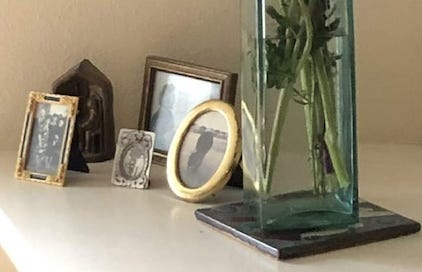“But, first, remember, remember, remember the signs. Say them to yourself when you wake in the morning and when you lie down at night, and when you wake in the middle of the night. And whatever strange things may happen to you, let nothing turn your mind from following the signs. And secondly, I give you a warning. Here on the mountain I have spoken to you clearly: I will not often do so down in Narnia. Here on the mountain, the air is clear and your mind is clear; as you drop down into Narnia, the air will thicken. Take great care that it does not confuse your mind. And the signs which you have learned here will not look at all as you expect them to look, when you meet them there. That is why it is so important to know them by heart and pay no attention to appearances. Remember the signs and believe the signs. Nothing else matters.” C.S. Lewis, The Chronicles of Narnia
We Christians are big on holy remembering. We are also big on acts of mercy. That’s what came to mind this morning as I read today’s “Dispatch Faith.”
This posting is introduce “Dispatch Faith” to you. You can read today’s articles for free — HERE
The lead piece is on the place of remembering in the Jewish faith. The rest is about Asheville and that area of the nation — what they have experienced and how people of faith are responding. Two quotes that touched me are below.
“And for Judaism we remember because it is a command to remember. “Remember” is the most repeated commandment in the Bible. The imperative of the Hebrew word zachor is mentioned more than 25 times. We are asked to remember what God has done for us, that we have survived the hardships. We place a mezuzah on the doorpost to remember. Even those things seemingly too painful to remember we are enjoined to recall. … For the Jewish people amnesia is not an option. Jewish memory is both a tribute and a harbinger. It is what we owe to God, and to those who suffered and those who died.”
In Asheville - “Teams of Southern Baptist volunteers on chainsaw crews are deploying out to clear trees, tarp roofs damaged by wind and trees, and to treat flooded homes to try and prevent mold.” And at St. Michael the Archangel in Erwin, Tennessee “which lost two of its members in the floods, is mobilizing. …“Immediately after the storm, he said, parishioners began collecting water, nonperishables, baby products, cleaning products — ‘everyday items that we sometimes forget about, that these people who lost everything need.”
This abides,
Brother Robert, OA





In human history there seems to be two broad forms of what we do with remembering. One is we respond with gratitude and build a better life. The other is we respond with grievance and violence.
Recollecting, remembering, these are often the beginning of prayer for me.
The article recollects for me a series of interviews of indigenous people from the US thinking about Columbus, and of course what Palestinians remember both before and after the Nakba.
I also admit some hesitation. I’m not always sure if my own memory is right - or complete. In its comprehensiveness, I believe scripture offers multiple ways to understand God’s providence, and that reveals how even the people central to our spiritual life - Abraham, Jacob, David, were not always persons worth emulating.